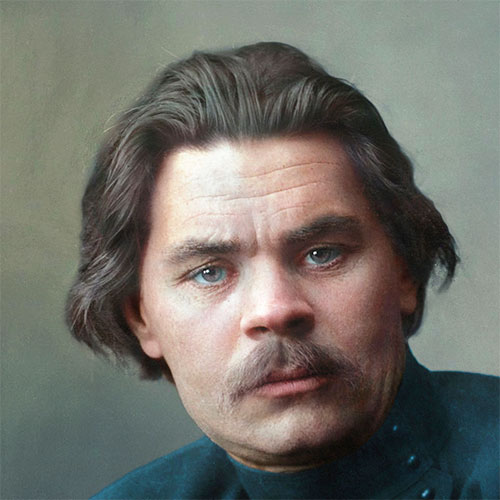
Maxim Gorky Poems
A Kazan newspaper reported in 1887 the discovery of a baker, Aleksey Peshkov, found unconscious on the shore of the Volga after trying to commit suicide. It was the first printed mention of a man whose talent and destiny would bring him worldwide fame as Maksim Gorky.
Gorky was the first writer to describe Russia from inside the world of workers, wanderers, and unfortunates. While Lev Tolstoy and Sergey Aksakov portray their aristocratic childhoods in their works, Gorky’s Childhood (1913) and In the World (1916), the first two volumes of his autobiography, reveal the common person’s childhood- no less precious and poetic. Gorky was a romantic of the lower depths who predicted and supported the Revolution, never suspecting the vileness that could arise from those depths when they were stirred up by irresponsible agents.
In Russia in his lifetime, Gorky was second only to Tolstoy in popularity. Although his poetry retreats significantly before his best prose, there was not a single person in pre-Revolution Russia who would not have known his “Song of the Stormy Petrel," reprinted here. The Revolution prophesied by his “Stormy Petrel," though, turned out to be not at all what Gorky had envisioned.
After supporting the Bolsheviks before the Revolution, Gorky abruptly voiced his opposition to the Red violence that replaced the decrepit, crumbling autocracy. His articles, printed in the newspaper Novaya zhizn (New Life), were collected in a book of anti Bolshevik and anti Leninist commentary, Nesvoevremennye mysli (Ill-Timed Thoughts) (1918), which holds the distinction of being among the first books forbidden and confiscated by Soviet authorities as they launched a revival of censorship far more terrible than under the Tsars. The book was repressed and all but forgotten while Gorky was canonized a Communist saint.
One school of thought considers Gorky guilty of everything that happened to Russian culture under bolshevism. This charge has a concrete foundation: to Gorky belong the words “If the enemy doesn’t give up, he must be exterminated”; and Gorky is largely responsible for the theory of Socialist Realism, which so throttled all creativity. Gorky also headed a group of writers who in the 1930s made a propaganda voyage to the Solovetsky gulag on the Belomor Canal, which had been built with convict labor. But it is also important to remember that he took great risks to help the intelligentsia, saving many from Bolshevik violence, and we now know from newly surfaced documents that Gorky wanted to leave Soviet Russia for good in the early 1920s. The diaries of Romain Rolland concerning his trip to the USSR in the 1930s (published according to his will fifty years after his death) confirm that Gorky was not politically blind. It seems clear that Gorky understood the full depth of the tragedy taking place in Russia. Some believe that Gorky agreed to his propaganda trip only to expose Stalin’s tyranny and that Stalin surmised the writer’s intentions and did away with him as part of the systematic repression of intellectual opposition. The exact circumstances of his death are clouded in mystery, but Gorky dead was more comfortable for Stalin than Gorky alive.
1895
1901
1902
1905
in germanMaxim Gorki, gedichte (deutsch)
1901
1905
in spanishMáximo Gorki, poemas (español)
1901
in hebrewמקסים גורקי, שירים (עברית)
1901
- שִׁיר הַיַסְעוּר ✍️️